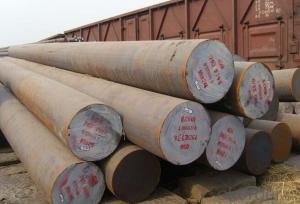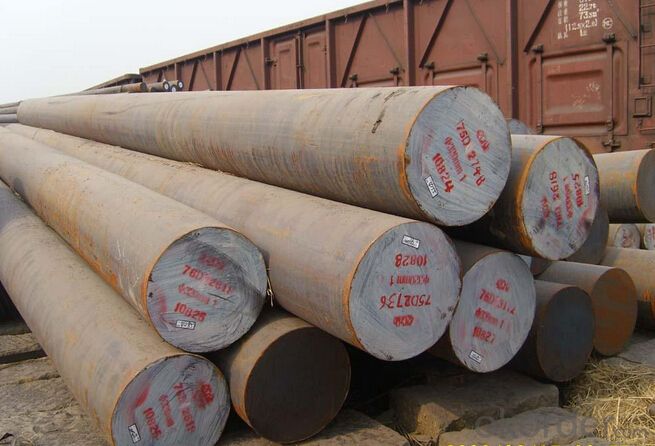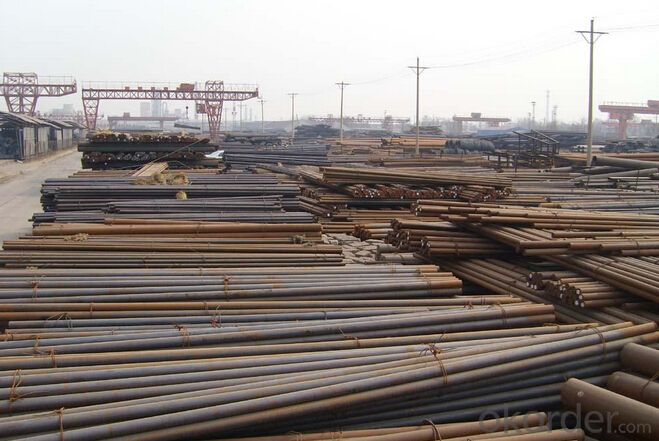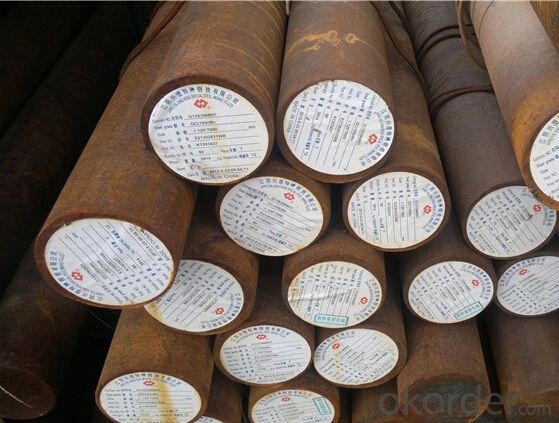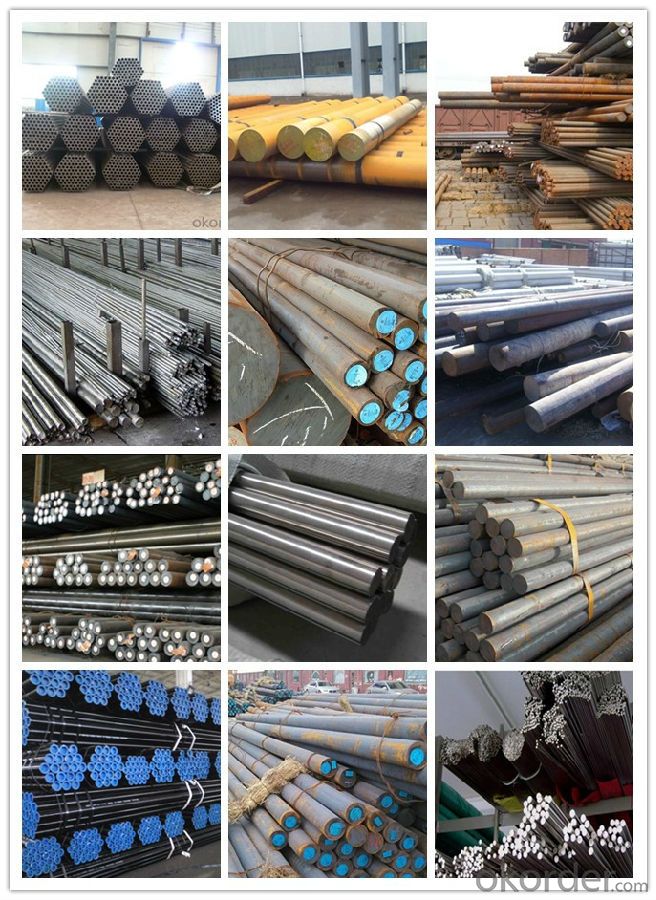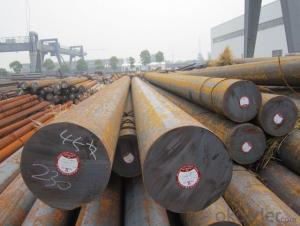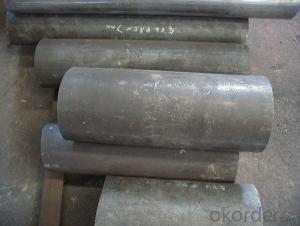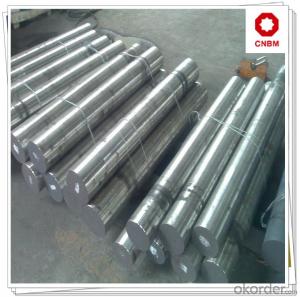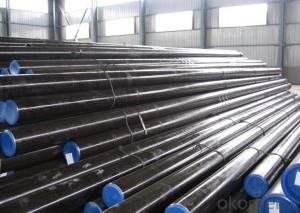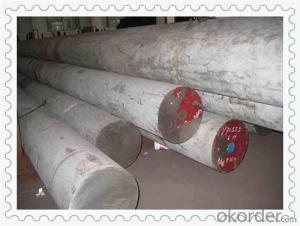Special Steel SAE1010 Carbon Steel Round Bars
- Loading Port:
- China main port
- Payment Terms:
- TT OR LC
- Min Order Qty:
- 30 m.t.
- Supply Capability:
- 10000 m.t./month
OKorder Service Pledge
OKorder Financial Service
You Might Also Like
Specification
Specification :
| Size | round | Dia 16mm~350mm |
| Standard | GB/T699-1999 | |
| Surface Condition | Black surface | |
| Delivery Condition | hot rolled | |
| Payment Terms | T/T;L/C | |
| Trade Terms | FOB;CIF | |
Product List :
| GB | ASTM | JIS | EN | DIN |
| 10# | 1010 | S10C | C10C | 1.0214 |
| 15 # | 1015 | S15C | C15C | 1.0234 |
| 20 # | 1020 | S20C | C22 | 1.0411 |
| 25 # | 1025 | S25C | C25 | 1.0406 |
| 30 # | 1030 | S30C | C30 | 1.0528 |
| 35 # | 1035 | S35C | C35 | 1.0501 |
| 40 # | 1040 | S40C | C40 | 1.0511 |
| 45 # | 1045 | S45C | C45 | 1.0503 |
| 50 # | 1050 | S50C | C50 | 1.054 |
| 55 # | 1055 | S55C | C55 | 1.0535 |
| 60 # | 1060 | S58C | C60 | 1.0601 |
| 65 # | 1065 | SWRH67B | C66D | 1.0612 |
| 70 # | 1070 | SWRH72A | C70D | 1.0615 |
| 75 # | 1075 | SWRH77A | C76D | 1.0614 |
| 80 # | 1080 | SWRH82A | C80D | 1.0622 |
| 85 # | 1084 | SWRH82A | C86D | 1.0616 |
Product show
Workshop show
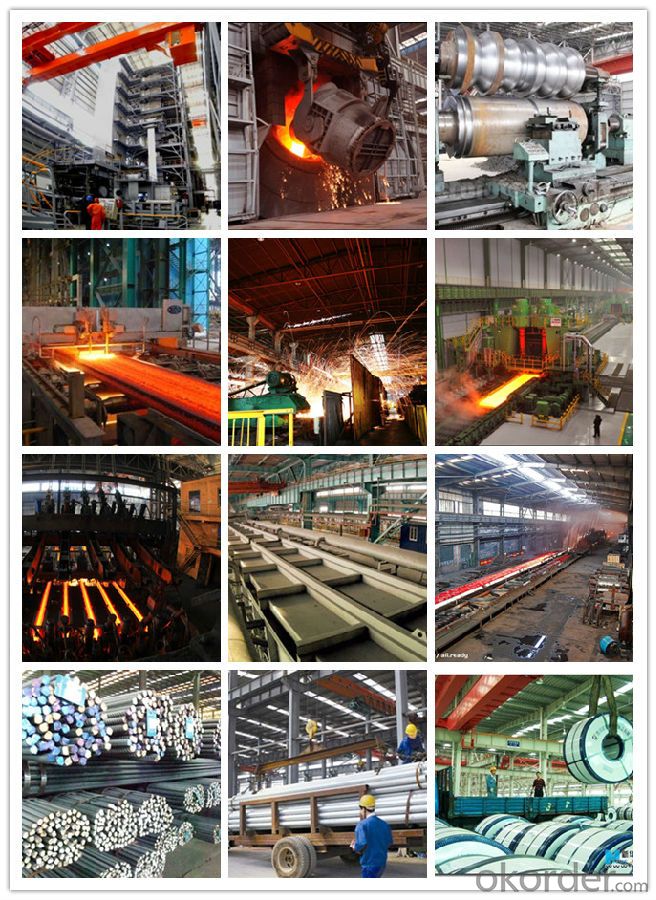
Shipping
1. FedEx/DHL/UPS/TNT for samples, Door-to-Door;
2. By Air or by Sea for batch goods, for FCL; Airport/ Port receiving;
3. Customers specifying freight forwarders or negotiable shipping methods!
Delivery Time: 3-7 days for samples; 5-25 days for batch goods.
Payment Terms
1.Payment: T/T, L/C, Western Union, MoneyGram,PayPal; 30% deposits; 70% balance before delivery.
2.MOQ: 1pcs
3.Warranty : 3 years
4.Package Informations: 1) EXPORT, In 20 feet (GW 25 ton) or 40 feet Container (GW 25 ton)
2)as customer's requirement
Why choose us?
(1) The leading exporter in China special steel industry.
(2) Large stocks for various sizes, fast delivery date.
(3) Good business relationship with China famous factories.
(4) More than 7 years steel exporting experience.
(5) Good after-sales service guarantee.
- Q: What are the properties of carbon steel?
- Carbon steel is a type of steel that primarily consists of iron and carbon, with trace amounts of other elements. It is known for its strength, durability, and high melting point. Carbon steel is also highly malleable, making it easy to form into various shapes and structures. Additionally, it exhibits good corrosion resistance, although it is not as resistant as stainless steel. Overall, carbon steel is widely used in industries such as construction, automotive, and manufacturing due to its excellent mechanical properties.
- Q: How does special steel perform in high-pressure hydrogen environments?
- Special steel performs well in high-pressure hydrogen environments due to its high strength, corrosion resistance, and ability to withstand hydrogen embrittlement. It offers reliable performance and minimizes the risk of hydrogen-induced failures, making it a suitable choice for applications such as hydrogen storage, transportation, and fuel cells.
- Q: How does special steel contribute to improving product quality?
- Special steel contributes to improving product quality in several ways. Firstly, special steel has superior strength and durability compared to ordinary steel, making it less likely to deform or break under stress. This ensures that products made with special steel have a longer lifespan and are more reliable for consumers. Secondly, special steel can be engineered with specific properties such as corrosion resistance, heat resistance, or high hardness, which are essential for certain industries or applications. This allows manufacturers to create products that can withstand harsh environments or demanding conditions, ultimately enhancing product quality. Lastly, special steel can be precision-machined to tight tolerances, enabling the production of complex and intricate components with high precision. This level of accuracy results in better-fitting parts, improved performance, and enhanced overall product quality.
- Q: Can special steel be used for precision instruments?
- Yes, special steel can be used for precision instruments. Special steel, known for its high strength, durability, and resistance to corrosion, is often used in the manufacturing of precision instruments such as surgical tools, watches, measuring devices, and scientific equipment. Its unique properties allow for precise and accurate performance, making it an ideal material choice for precision instruments.
- Q: What are the different methods of measuring the hardness of special steel?
- There are several methods available for measuring the hardness of special steel. These methods can be categorized into two main categories: destructive and non-destructive testing. 1. Rockwell Hardness Test: This is a widely used destructive testing method that measures the depth of penetration of an indenter into the steel surface. The Rockwell hardness test provides a hardness value based on the resistance of the steel to indentation. It is a simple and quick method that requires minimal sample preparation. 2. Brinell Hardness Test: Another destructive testing method, the Brinell hardness test, involves applying a known load to a hardened steel ball and measuring the diameter of the indentation left on the steel surface. The hardness value is determined based on the ratio of the applied load to the surface area of the indentation. 3. Vickers Hardness Test: This is a micro-indentation test that utilizes a diamond pyramid-shaped indenter. The Vickers hardness test measures the diagonal length of the indentation left on the steel surface and calculates the hardness value based on the applied load. 4. Knoop Hardness Test: Similar to the Vickers test, the Knoop hardness test is a micro-indentation method that uses a diamond pyramid-shaped indenter. However, instead of measuring the diagonal length of the indentation, it measures the length of the long axis. This test is particularly useful for measuring the hardness of thin steel samples or steel coatings. 5. Ultrasonic Hardness Test: This non-destructive testing method measures the hardness of steel by analyzing the propagation of ultrasonic waves through the material. The hardness value is determined based on the correlation between the velocity of the waves and the hardness of the steel. 6. Magnetic Hardness Test: This non-destructive testing method utilizes magnetic properties to measure the hardness of steel. It involves applying a magnetic field to the steel and measuring the magnetic response. The hardness value is determined based on the correlation between the magnetic response and the hardness of the steel. It is important to note that each method has its advantages and limitations, and the choice of method depends on factors such as the type of steel, the required accuracy, the sample size, and the available equipment and expertise.
- Q: How does special steel perform in cryogenic gas environments?
- Special steel performs well in cryogenic gas environments due to its low temperature resistance and high strength. It has excellent toughness and can withstand extreme cold temperatures without becoming brittle or undergoing significant deformation. This makes it ideal for applications such as cryogenic storage tanks, pipelines, and equipment used in industries like aerospace, energy, and scientific research, where materials need to maintain their integrity and performance in extremely cold conditions.
- Q: How is free-cutting steel used in the production of precision components?
- Free-cutting steel is used in the production of precision components due to its enhanced machinability. This type of steel contains additives such as sulfur, lead, or bismuth, which help in breaking the chips during machining, resulting in improved cutting performance. This makes it easier for manufacturers to achieve high precision and accuracy when shaping and forming the steel into intricate components. Additionally, free-cutting steel reduces tool wear and increases production efficiency, making it a preferred choice in industries requiring precise and complex parts, such as automotive, aerospace, and medical.
- Q: How is alloy steel used in the manufacturing of gears and shafts?
- Alloy steel is commonly used in the manufacturing of gears and shafts due to its superior strength, durability, and resistance to wear and tear. Its unique properties make it ideal for withstanding high torque and heavy loads, ensuring smooth and efficient operation of gears and shafts in various industrial applications.
- Q: What properties make special steel unique?
- Special steel, also known as alloy steel, possesses unique properties that set it apart from other types of steel. Firstly, special steel is distinguished by its exceptional strength and hardness. It is engineered to have a high resistance to deformation, making it suitable for applications that require robust materials. Whether in construction, automotive, or aerospace industries, special steel provides the necessary durability and reliability. Another remarkable property of special steel is its superior corrosion resistance. By incorporating certain alloying elements such as chromium, nickel, or molybdenum, this type of steel becomes highly resistant to rust and other forms of corrosion. As a result, special steel is often used in marine environments, chemical plants, and oil and gas industries where exposure to harsh conditions is prevalent. Furthermore, special steel demonstrates excellent heat resistance. It can withstand high temperatures without losing its strength or structure, making it suitable for applications in extreme heat environments, such as power generation or furnace components. This property allows special steel to be utilized in critical situations where other materials may fail or degrade. Special steel is also known for its versatility and adaptability. With various alloying elements and heat treatment processes, it can be tailored to meet specific requirements of different industries. This flexibility makes it possible to create specialized alloys with unique properties, such as improved machinability, wear resistance, or enhanced magnetic properties, catering to a wide range of applications. In conclusion, the properties that make special steel unique are its exceptional strength and hardness, superior corrosion resistance, excellent heat resistance, and its versatility in being tailored to specific requirements. These properties make special steel an invaluable material in numerous industries, enabling the development of innovative and reliable products.
- Q: How does special steel compare to other materials such as aluminum or titanium?
- Special steel boasts a unique set of advantages and characteristics when compared to materials like aluminum or titanium. Firstly, its exceptional strength and durability set it apart. With a higher tensile strength than aluminum and titanium, it is ideal for applications that require withstanding heavy loads or high-stress environments. This strength also ensures a longer lifespan by resisting wear and tear. Furthermore, special steel maintains its mechanical properties even at extreme temperatures. Unlike aluminum and titanium, which experience a significant decrease in strength at elevated temperatures, special steel retains its structural integrity, making it suitable for applications involving high temperatures or thermal cycling. In terms of cost-effectiveness, special steel often proves to be more affordable than titanium, especially in large-scale production. While aluminum is generally cheaper than special steel, it may lack the same level of strength or resistance to corrosion, limiting its applicability in certain industries. Additionally, special steel exhibits excellent machinability and can be easily formed into different shapes and sizes, allowing for greater design flexibility. This quality makes it suitable for various industries such as automotive, aerospace, construction, and manufacturing, where complex components or structures are required. Lastly, special steel showcases superior corrosion resistance compared to aluminum and titanium. It can be treated or coated to provide additional protection against rust and other forms of degradation, further extending its lifespan. In summary, special steel surpasses aluminum and titanium in terms of strength, durability, temperature resistance, and corrosion resistance. Its cost-effectiveness, machinability, and versatility make it a preferred material in various industries, where high-performance and reliability are crucial factors.
Send your message to us
Special Steel SAE1010 Carbon Steel Round Bars
- Loading Port:
- China main port
- Payment Terms:
- TT OR LC
- Min Order Qty:
- 30 m.t.
- Supply Capability:
- 10000 m.t./month
OKorder Service Pledge
OKorder Financial Service
Similar products
Hot products
Hot Searches
Related keywords
